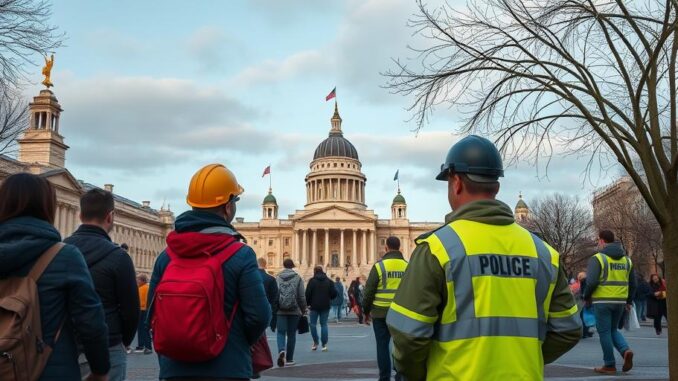
Summary
This article examines the UK government’s response to the Grenfell Tower Inquiry, focusing on the Housing, Communities and Local Government (HCLG) Committee’s recommendations. The committee stresses the need for independent oversight, improved building safety regulations, and resident engagement. These actions aim to prevent future tragedies and restore public trust.
Focus360 Energy: property compliance services – pre-planning to post-construction. Learn more.
** Main Story**
Okay, so it’s been almost eight years since the Grenfell Tower fire, and you’d think things would be moving faster, right? The UK government has accepted the Inquiry’s Phase 2 recommendations, but the Housing, Communities and Local Government (HCLG) Committee is pushing for more. And honestly, I’m with them on this one. Acceptance is just the first step; we need real action and accountability.
Essentially, they’re demanding some serious changes. I mean, it’s not just about ticking boxes, it’s about making sure a tragedy like that never happens again. What’s on their list? Let’s dive in.
Independent Oversight: Time to Stop the Self-Assessment
Here’s the big one: independent oversight. The HCLG Committee is calling for a national mechanism to monitor the implementation of recommendations from all public inquiries, not just Grenfell. Think of it as a watchdog, making sure the government isn’t just “marking its own homework,” as they put it. I couldn’t agree more. The idea is to have this system up and running before the tenth anniversary of the fire in June 2027.
They’ve even suggested including it in the upcoming “Hillsborough Bill”. See, this isn’t just about Grenfell; it’s about creating a system of genuine accountability across the board. And, you know, some of us think this is important. Why? Because trust has been eroded. This oversight, it’s not just desirable, it’s essential to rebuild that trust.
Engaging the Community and Enhancing Building Safety
Now, beyond the oversight bit, the HCLG Committee is hammering home the importance of actually engaging with the Grenfell community. I’m talking about real engagement, not just lip service. Ensuring the contact information is up to date, actively seeking their input on future decisions—it’s all crucial.
And here’s something else to consider: there are groups, particularly those from minority ethnic backgrounds, who might not have been fully heard in the past. The Committee wants to be inclusive, ensuring everyone has a voice. Makes sense, right?
Building safety is another key area. They want to ramp up the efficacy of the Building Safety Regulator (BSR) and speed up building remediation. But, and this is a big but, they want to make sure the funding is fair. Implementing things like Personal Emergency Evacuation Plans (PEEPs) for disabled residents in high-rise buildings is a must. Also, reviewing the decision not to mandate sprinklers in existing care homes—definitely something that needs a second look, dont’ you think?
Financial Accountability: Where’s the Money Coming From?
Okay, let’s talk money. The HCLG Committee wants the government to explain how it plans to address developers’ concerns about the Building Safety Levy. This levy, it’s supposed to come into effect in Autumn 2026. The concern is that it will negatively impact housing supply, and the questions they’re asking are important. What’s the revised estimate of the levy’s intended revenue? Are there inequalities in access to remediation funds between social housing providers and private landlords? And don’t forget, they want the government to incorporate recommendations from the Public Accounts Committee into the Remediation Acceleration Plan (RAP). These recommendations are all about protecting residents from remediation costs.
Because, well, it’s not right that residents should bear the brunt of these costs, is it? It should be fairer, that’s all I’m saying.
So, what’s the takeaway here? This response to the Grenfell Inquiry is, in my view, a critical moment for UK building regulations. It’s not just about fixing what went wrong in the past; it’s about building a safer future. The focus on independent oversight, engagement with residents, better building safety measures, and financial accountability—all of it points to a more transparent, resident-centric approach.
Look, as the UK figures out all these complexities, the implementation of these recommendations will be vital in rebuilding public trust. And if we’re being honest, that trust has been shaken. The ultimate goal? To ensure a tragedy like Grenfell never, ever happens again. This is current as of today, May 29, 2025.


The call for independent oversight is crucial. Applying lessons learned from Grenfell across all public inquiries, as suggested for the Hillsborough Bill, could significantly improve accountability and public trust in governmental responses to major incidents.
Absolutely! The potential of applying the Grenfell lessons to the Hillsborough Bill, as you mentioned, could set a powerful precedent. It’s about creating a system where all public inquiries lead to tangible improvements and genuine accountability, fostering trust across the board. Thanks for highlighting that important connection!
Editor: FocusNews.Uk
Thank you to our Sponsor Focus 360 Energy
The emphasis on resident engagement is key. Actively seeking input, especially from minority ethnic groups, ensures a more inclusive and effective approach to building safety and trust. Ongoing dialogue is essential for successful implementation of recommendations.
You’re absolutely right; resident engagement is paramount. Going beyond surface-level consultation to proactively seeking diverse perspectives, especially from minority ethnic groups, is essential. This ensures a truly inclusive and effective approach to building safety, fostering a stronger sense of trust and shared responsibility. How can we best facilitate these crucial dialogues?
Editor: FocusNews.Uk
Thank you to our Sponsor Focus 360 Energy